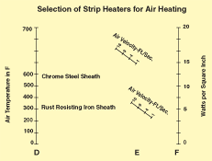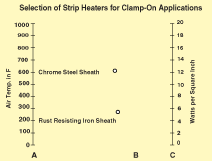Strip Heaters
Introduction to Strip Heaters
A strip heater is a device which is mounted on a surface and used to heat the surface or air (gasses). OMEGA Engineering offers a wide range of
strip heaters in Australia.
Application of Strip Heaters
OMEGALUX™ strip heaters are used principally for convection-type air heating and clamp-on installations. When selecting strip heaters for either, two important factors must be considered: The proper sheath material for resisting any rusting and oxidizing inherent in the process or environment and for withstanding the sheath temperature required. Standard sheath materials are rust resisting iron, chrome steel and Incoloy (NS Series only). Stainless steel and Monel sheaths are available at an additional charge. Maximum work and sheath temperatures are below. The watt density of the element, or watts per square inch of heated area. This should be low for heating asphalt, molasses and other thick substances with low heat transferability; it can be higher for heating air, metals and other heat conducting materials. (See curves for determining allowable watt densities).

Selection of Strip Heaters for Air Heating
1. Select maximum desired operating air temperature on (D)
2. Choose either chrome steel sheath or rust-resisting iron sheath (points E) on basis of operating conditions
3. Draw straight line through points (D) and (E) to reading on (F) giving maximum allowable watts per square inch
4. Select desired length heater with equivalent watt density or less

Selection of Strip Heaters for Clamp-On Applications
1. Select maximum desired work temperature on (A)
2. Choose either chrome steel sheath or rust-resisting iron sheath (points B) on basis of operating conditions
3. Draw straight line through points (A) and (B) to reading on (C) giving maximum allowable watts per square inch
4. Select desired length heater with equivalent watt density or less

Selection of Watt Density for Finned Strips
1. Select a maximum desired air temperature on A
2. Choose sheath material to suit operating conditions
3. Select minimum anticipated air velocity on B. Note: Natural circulation is equal to one foot per second
4. Draw straight line through the points selected on A and B - read C for allowable watt density
5. Select required length heater with equivalent watt density or less
When high operating temperatures are needed, watt density must be limited in order not to exceed the maximum sheath temperature. Watt density is given in the "How To Order" table for each strip heater. In general, a viscous material with low thermal conductivity requires a low watt density. High watt densities can be used with thinner liquids and with materials of high thermal conductivity. Premature loss of the element due to excessive temperature may result if the material's heat-take-away ability is low. Also, the material may be charred, carbonized or its chemical makeup altered by overheating.other derived quantities, e.g., moments, pressures, accelerations, displacements, vibrations and others. The transducer generally contains a pressure sensitive diaphragm with strain gages bonded to it.
Shop for Strip Heaters in Australia
The OMEGA Engineering Singapore office handles all inquiries and orders for Australia. We have Application Engineers and Sale Support Staff ready to assist you with your technical questions, quotations and orders. A one-stop source for process measurement and control, OMEGA provides support through web chat, e-mail and telephone. View our
contact page to call or email us.
Strip Heater | Related Products
↓ View this page in another language or region ↓



